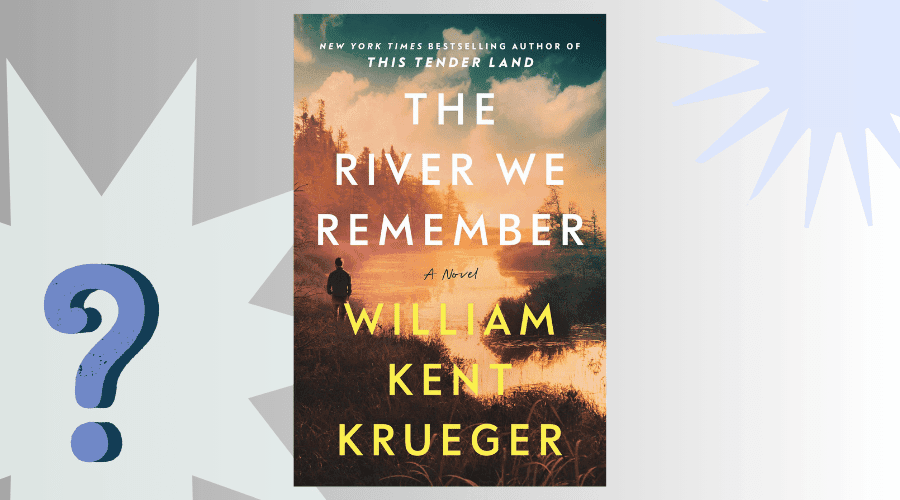The River We Remember would be a fantastic pick for a book club—especially if your group loves literary fiction with deep themes, complex characters, and a touch of mystery.
Why It’s Great for a Book Club
- Engaging Mystery: The murder of Jimmy Quinn sets off a gripping investigation filled with twists and small-town secrets. Lots to discuss!
- Moral Dilemmas: The book dives into prejudice, post-war trauma, and justice—all juicy topics that spark debate. Your club could have a whole discussion about whether the town’s suspicions were fair.
- Emotional Depth: William Kent Krueger is a master at writing character-driven stories. His books always explore the human condition in a way that makes them super discussable.
- Small-Town Drama: If your club loves books that capture the vibe of small-town life, dark secrets, and tight-knit communities, this book will be right up your alley.
- Timely Themes: It covers racism, war trauma, and small-town justice, which makes it super relevant despite being set in the 1950s.
20 The River We Remember Book Club Questions for Discussion
Here are 20 thought-provoking book club questions for The River We Remember that will spark deep discussion and debate.
General Themes & Plot
- The book opens with the discovery of Jimmy Quinn’s body. How did this initial mystery set the tone for the novel?
- Did you suspect the true killer? Why or why not?
- What role does justice vs. revenge play in the story? Do you think the town wanted justice or just someone to blame?
- The novel is set in 1958 in a small Minnesota town. How do you think the setting shaped the characters’ attitudes and decisions?
- What did you think of the ending? Did it provide a satisfying resolution, or did you want more?
Characters & Relationships
- Sheriff Brody Dern is a complex character with a troubled past. How do his war experiences influence the way he handles the case?
- Noah Bluestone, a Native American WWII veteran, becomes a suspect. How does the novel explore racism and prejudice through his character?
- How does Kyoko Bluestone, Noah’s Japanese wife, challenge the town’s biases? What role does she play in the larger themes of the book?
- What are your thoughts on the town’s reaction to the murder? Did you find their paranoia and rumors realistic?
- Did any side characters surprise you? Which ones stood out the most and why?
Themes & Symbolism
- The Alabaster River is central to the story (even in the title). What do you think it symbolizes?
- The book explores the scars of war—both physical and emotional. How do different characters deal with their past traumas?
- How does the book portray small-town life—as comforting, claustrophobic, or both?
- The novel is deeply layered with themes of outsiders vs. insiders. Which characters do you think felt the most isolated?
- How does Krueger use nature and the environment to enhance the novel’s themes?
Writing Style & Structure
- Krueger’s writing is often called lyrical and atmospheric. Did you enjoy his style? Why or why not?
- The book shifts between different perspectives. Did this enhance the story, or did you find it confusing?
- The pacing of the novel balances mystery and deep character exploration. Did you think the balance was effective?
- If you could ask William Kent Krueger one question about this book, what would it be?
- Would you recommend this book to others? Why or why not?
These questions will definitely ignite deep discussion and keep your book club engaged!
The River We Remember: Discussion Topics
If your book club is diving into The River We Remember, there’s so much more to discuss beyond just answering questions! You can explore deeper themes like crime and justice in small towns, comparing how the investigation unfolds in the book versus how it might play out today. The town’s rush to judgment about Noah Bluestone is a fascinating conversation starter—was it fear, racism, or just small-town gossip at its worst? And speaking of Noah, his experience as a Native American WWII veteran adds another layer, especially when compared to Brody Dern’s own struggles with war trauma. It’s worth discussing how both men process their pasts differently and what the book is saying about PTSD and the scars that never fully heal.
Another huge theme is the idea of outsiders in a tight-knit community. Kyoko Bluestone faces racism and suspicion simply because she’s different. Does the town’s treatment of her feel historically accurate? More importantly, does it still feel relevant today? And then there’s the deeper, more personal element of the novel—secrets, regrets, and the weight of the past. Nearly every character is haunted by something, but who carries the heaviest burden? Does the book suggest that people can truly move on, or are we all just shaped by our pasts forever?
Symbolism also plays a big role, especially the Alabaster River itself. It’s almost like a character in the novel, both hiding and revealing secrets at different moments. How does that connect to the themes of justice, memory, and the inescapable nature of the past? The title suggests that the river “remembers,” but what does that really mean?
Beyond discussion, there are so many ways to make your book club gathering more interactive. A fun idea would be to have each person pick a character and break down their biggest strength and flaw—would everyone agree? You could also imagine The River We Remember as a movie and cast the main characters, debating who would bring them to life best on screen. If anyone in your club has read William Kent Krueger’s Ordinary Grace or This Tender Land, it might be interesting to compare his writing style and themes across books. And for a more debate-style discussion, you could focus on the novel’s ending and whether the final resolution of the murder was truly just. Did the right people face consequences? Would justice have looked different if another character had been in charge?
With all these angles to explore, your book club will have a rich and engaging discussion, leaving plenty to think about long after the meeting ends.

